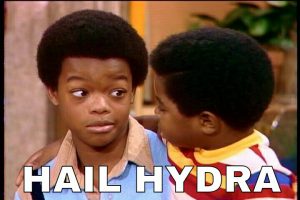Writing: The Work You Don’t Want to Do

It all makes sense now.
The cold truth is, writing is the easiest part of writing for a living. The actual writing? Easy. Give me a topic, five minutes on the Internet, and a keyboard and I can gin up 500 words on just about any subject. Give me three months and a monetary incentive and I’ll write a novel. The act of writing words has never been much of a problem for me. I understand I’m not everyone; some writers do in fact struggle with the actual writing, and many of them produce great work. As Diff’rent Strokes taught us, it’s take different strokes to move the world. What might be right for you might not be right for some.
<wanders off, singing the Diff’rent Strokes theme song>
Where was I? Right: Writing is the easy part. If you want to make your living writing, however, a lot of more difficult skill sets come into play. If you want to actually make money from writing and you haven’t been able to get the six-figure advance or sell the film rights before you’ve even written the damn book like Garth Risk Hallberg, you’re going to have to learn to do a few things that—if you’re like me—you don’t really want to do. Things like
Make the Phone Calls. I do a fair bit of freelance writing to pay my enormous liquor bills, and some of it requires me to make phone calls and speak to people, usually people who don’t find me entertaining or charming. It’s my least-favorite aspect of the work, but it must be done.
Write the Synopses. If you’ve ever tried to sell a novel, you know the peculiar hell of trying to boil 90,000 words down to three paragraphs of pithy plot. But if you want to sell that novel, you have to do it.
Make the Pitches. When you freelance, pitching ideas is a constant. It is something you do every day, and it’s kind of exhausting sometimes, but you either do it or you earn about $500 a year.
Take Edits. Look, you and I both know that sometimes we nail it. Sometimes we write something great, and sometimes the feedback we get from clients or editors is less than coherent. Sometimes you get that edit letter and you just have to step outside and let out a primal scream … but you go back in and revise.
Massage Text. Sometimes your first draft is perfectly fine, but you have to go back and massage it anyway. Maybe to fall in line with style or SEO guidelines, maybe to hit a specific word count or other formatting metric, or maybe just because a client or editor didn’t like it.
These are things no one wants to do. I’d much rather write whatever I feel like and collect fat checks for each piece as I finish them. But if you’re looking to write for a living, forget twaddle like write every day–that advice is basically telling you to do something you already want to do. Instead, do the stuff you don’t want to do. That’s the best use of your time.









